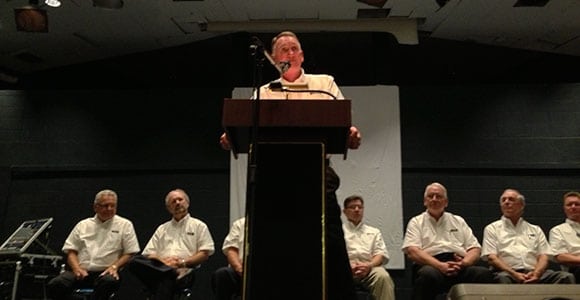Baseball, hot dogs and apple pie all go together. At least that’s what Chevrolet used to tell us. But, what about this combination: hot dogs, fiber optics, gospel singing and solar farms? It’d be difficult to put those together — and nearly impossible to sing about.
Unless you’re a member of an electric cooperative, that is.
At a recent cooperative annual meeting, the featured entree was hot dogs with your choice of toppings. The premeeting entertainment was a regionally known gospel quartet. Both were pretty good.
The cool evening, food and entertainment weren’t the focus of the night, however. This was a business meeting — a required event where the trustees and management of the cooperative deliver their annual reports to the member-owners of the cooperative.
If you had driven through the parking lot, you might have thought that this was a family reunion, a neighborhood block party or even a church homecoming. Then someone began talking about fiber optics and solar farms.
As the president of the co-op made his report, this didn’t seem like your father’s electric cooperative. He updated the members on the fiber optic cabling that the cooperative is installing throughout its system. This fiber backbone provides the cooperative with lightning-fast communications from the co-op’s meters and substations back to the main office, providing critical data that allows the co-op to efficiently maintain the electric grid. Sometimes the cooperative staff knows your lights are out before you know yourself. The fiber also can be used to provide needed broadband Internet access to rural areas.
The CEO also discussed the cooperative’s partnership in the operation of two 20 megawatt solar farms being built near the co-op’s new office. When completed, the installation will cover 300 acres with 160,000 solar panels. It will be the largest solar array in the state.
Across the nation, electric cooperatives lead the way in bringing renewable energy into the mix. The National Renewables Cooperative Organization (NRCO) was designed to facilitate the development and deployment of clean-energy projects. NRCO allows co-ops to invest capital in or purchase power from these projects, regardless of where they are located. This strategy inserts clean energy sources into the nation’s fuel mix and reduces clean energy costs for co-ops.
In our state, with the project described above and the already operational West Tennessee Solar Farm in Haywood County, the Tennessee Valley Authority and our electric cooperatives are moving forward with renewable energy options that are achievable.
All of this is being accomplished without unreasonable and unaffordable mandates. It’s easy to be supportive of clean energy. It’s a lot more difficult to provide the energy you need, when you need it, at a price you can afford.
This melding of past and future, family atmosphere and business focus, is really nothing new for electric cooperatives. They’ve always shown a dogged determination to do whatever it takes to keep the lights on and improve the quality of life in the communities we serve.
Maybe it is still your father’s co-op. But it’s also your co-op, and it will be there for your children as well.



